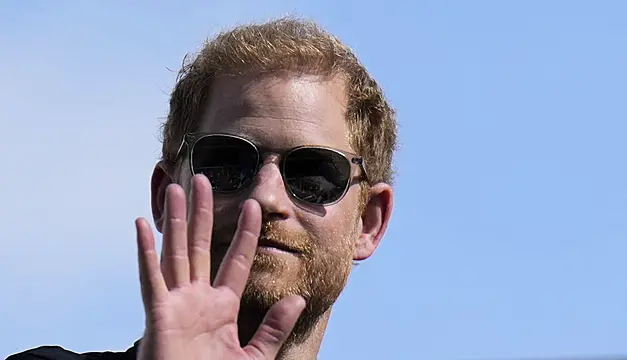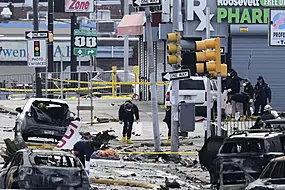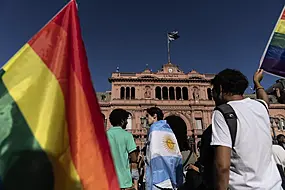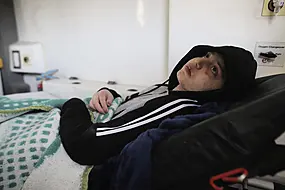Britain's Prince Harry believes his children cannot “feel at home” in the UK if it is “not possible to keep them safe” there, the High Court has heard.
In a written witness statement prepared for his legal challenge against the UK Home Office over a change to his security arrangements when visiting, Harry said he and his wife had been “forced” to leave the country in 2020.
At a hearing in London on Thursday, Harry’s barrister, Shaheed Fatima KC, said Harry did not accept that it was a “choice” for him to have stopped being a “full-time working member of the royal family”.
The lawyer read out an excerpt from Harry’s statement in which he said: “It was with great sadness for both of us that my wife and I felt forced to step back from this role and leave the country in 2020.
“The UK is my home. The UK is central to the heritage of my children and a place I want them to feel at home as much as where they live at the moment in the US. That cannot happen if it’s not possible to keep them safe when they are on UK soil.
“I cannot put my wife in danger like that and, given my experiences in life, I am reluctant to unnecessarily put myself in harm’s way too.”
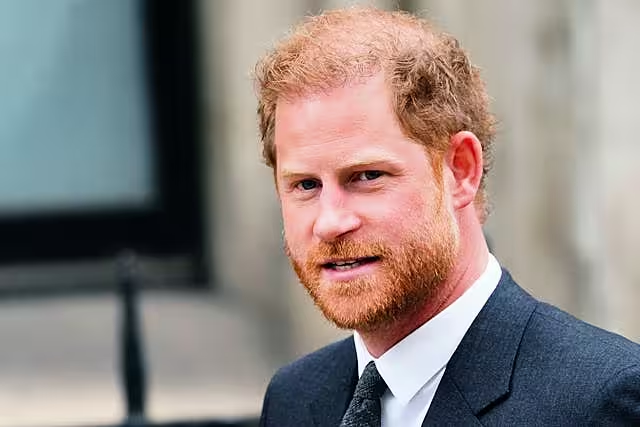
Harry now faces a wait for a judge’s ruling on his legal action against the Home Office after a two-and-half-day hearing at the Royal Courts of Justice concluded on Thursday.
Harry’s lawyers are challenging the February 2020 decision of the Executive Committee for the Protection of Royalty and Public Figures (Ravec) to change the degree of his publicly funded security, arguing it was “unlawful and unfair”.
The majority of the proceedings were held in private, without the public or press present, due to confidential evidence over security measures being involved in the case.
On Thursday, Ms Fatima said references by the Home Office’s lawyers to Harry no longer being a full-time working royal were “often said in a way that emphasised choice”.
She said the implication appeared to be: “Well, if this decision (by Ravec) is a consequence of a choice that the claimant (Harry) has made then that is somehow relevant.”
“It is not relevant to the grounds of the claim or the analysis that this court is required to do,” Ms Fatima said, later adding: “He doesn’t accept that this is a choice.”
Ms Fatima previously told the court that Harry was “singled out” and treated “less favourably” in a decision to change the level of his personal security.
She said Ravec failed to carry out a risk analysis and fully consider the impact of a “successful attack” on him.

The barrister said a “crucial” part of Ravec’s approach was an analysis carried out by the Risk Management Board (RMB), but it had chosen not to do this in Harry’s case.
She said it was the first time the body had decided to “deviate” from policy, with it adopting a “far inferior” procedure in relation to “critical safeguards”.
“No good reason has been provided for singling the claimant out in this way,” she said, later adding that if Ravec had “properly” considered Harry’s case the outcome was likely to have been “different”.
On Thursday, Ms Fatima added that a “lack of explanation” from the Home Office over the approach taken to record keeping and note-taking was “striking” given Ravec was dealing with an “exceptional and unprecedented” case.
She said evidence failed to show “clear or cogent or good reasons for departing from Ravec’s own policies and in support of the decision”.
Ms Fatima said Ravec’s policies were “legally enforceable” and that a “clear framework… protects the people that are involved in that decision-making”.
“If they deviate from it, they must expect that that is going to be considered and questioned. Especially when the stakes are so high,” she said.
But the UK government says Harry’s claim should be dismissed, arguing that Ravec – which falls under the Home Office’s remit – was entitled to conclude Harry’s protection should be “bespoke” and considered on a “case-by-case” basis.
Sir James Eadie KC, for the Home Office, said in written arguments that the decision “not to undertake an RMB analysis but to conduct a more bespoke, targeted assessment does not amount to treating (Harry) ‘less favourably’”.
He said Ravec judged “the bespoke process to be more effective, to allow more specific and informed consideration by Ravec of the threat and risk picture for each visit”, adding that the “flexible” approach would be of “greater benefit” to Harry.
Sir James said it was “simply incorrect” to suggest that there was no evidence that the issue of impact was considered, adding that the death of his mother Diana was raised as part of the decision.
He added: “Ravec gave greater weight to the impact on state functions being lessened as a result of the change, over likely significant public upset were a successful attack on (Harry) to take place.”
The barrister said Harry was no longer a member of the group of people whose “security position” was under regular review by Ravec, but he was “brought back within the cohort in the appropriate circumstances”.
Ravec has delegated responsibility from the Home Office over the provision of protective security arrangements for members of the British royal family and others, with involvement from London's Metropolitan Police, the UK Cabinet Office and the royal household.
Mr Justice Lane will give his judgment over the case at a later date.
The security case is one of five High Court claims Harry is involved in, including extensive litigation against newspaper publishers.
Harry, who was not present at the hearing, lives in North America with wife Meghan and their children Archie and Lilibet after the couple announced they were stepping back as senior royals in January 2020.
